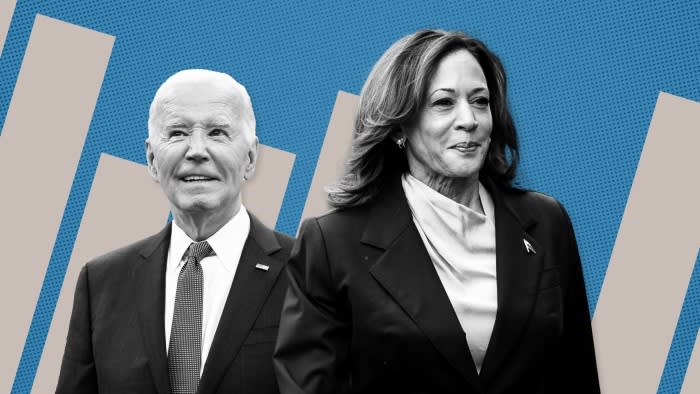In her first week of campaigning, Kamala Harris has been quick to unveil her economic vision for the American middle class if she beats Republican rival Donald Trump in November’s US presidential election.
“Building the middle class is a clear goal of my presidency,” she told cheering voters in a Wisconsin high school gym on Tuesday, “but Donald Trump is trying to take your country backwards.”
The presumptive Democratic nominee is already embracing the most popular parts of Joe Biden’s plan and legislative achievements while contrasting them with President Trump’s proposals, hoping to be less tainted than the president by the growing cost-of-living crisis in recent years.
Current and former Biden administration officials said Harris is expected to continue Biden’s plans to invest in domestic manufacturing, repair infrastructure and encourage green energy.
But she also will likely focus more heavily on the so-called “care economy” — increasing access to child care, paid family leave and education funding — plans that Biden was unable to get through Congress.
Perhaps most importantly, Harris may be able to defend the Biden administration’s economic policies to American voters more effectively than Biden himself, who has faced relentless attacks from Republicans, including President Trump, who has blamed her for rising prices.
Despite leading the U.S. out of the worst economic contraction since the Great Depression and presiding over record job growth, Biden has struggled to convince Americans that they will be better off under his leadership.
“Inflation has skyrocketed under President Biden, so I think people are looking at things with a Pavlovian reflex,” said Ernie Tedeschi, a former chief economist for the White House Council of Economic Advisers who is now director of economics at the Yale University Budget Institute.
But, he added, “I think it’s entirely possible that voters won’t blame Vice President Harris as much as they blame President Biden.”
Ms. Harris, a former prosecutor and California senator, does not have much of a background in economics: As vice president, her main economic advisers have been Mike Pyle, a former BlackRock economist who recently served on the White House National Security Council and is now with Macro Advisory Partners, and DeAnn Millison, who now works on manufacturing policy at Ford Motor Company.
But Biden administration officials say she holds mainstream center-left views on economic policy that would represent continuity, rather than divergence, from Biden’s approach.
“The core values reflected in this administration’s policies are ones that I believe Vice President Harris deeply supports,” U.S. Treasury Secretary Janet Yellen said at a news conference at the G20 summit in Brazil this week.
“She is clearly a supporter of middle-class families and knows they are key to America’s economic strength,” Yellen added. “She has focused on creating good jobs, lowering costs for Americans in critical areas like child care and health care, and training workers in the industries of the future.”
Harris’ policies to shore up the U.S. social security net were elements of Biden’s landmark $3.5 trillion “Build Back Better” plan for 2021 but were excluded from final passage in Congress.
“You can imagine that a very short, punchy package of policies built around the family-oriented parts of Biden’s platform will be in store for what we hope will be a second term,” Tedeschi said.
Ben Harris, a former top economic adviser to Biden and now at the Brookings Institution, said there was room for Harris to focus on housing, given her experience as a senator in bringing down rent prices.
This would expand efforts by the current administration, which has focused on housing-related issues in recent months. The White House recently announced a plan to cap rent increases nationwide and allocate additional funding to expanding the supply of affordable housing.
Felicia Wong, who served on Biden’s transition advisory committee and is now president of the progressive advocacy group Roosevelt Forward, expects Harris to be a more vocal advocate for American unions. One of the vice president’s first rallies as the de facto candidate was an event with members of the American Federation of Teachers, the second-largest teachers union in the country.
“One of the best ways to keep our country moving forward is to give workers a voice – by protecting our freedom to organize, defending the freedom to bargain collectively and ending union busting,” Harris said at an event in Houston, Texas, on Thursday.
Harris’ biggest challenge will be reversing efforts by Trump and the Republican Party to position itself as the party of the working class, especially in battleground states.
Harris has already criticized Trump for policies that she says would hurt working families, including tax cuts for the wealthy and corporations, flat tariffs on imports and mass deportations of immigrants. She is expected to stick to Biden’s pledge not to raise taxes on people making less than $400,000 a year.
“Ultimately, in November, voters will be choosing between two different paths for the future,” said Bharat Ramamurti, Biden’s former vice director of the National Economic Council. “The more the campaign focuses on Trump’s actual policies, the more I think they’ll be able to convince voters that that’s the wrong path.”
With inflation easing from 40-year highs in 2022 and the Federal Reserve preparing to lower borrowing costs, the improving economic environment could allow the Harris campaign to tout the economic success of the Biden-Harris package while also generating optimism for the Harris campaign’s own growth plans.
A recent survey by Democratic pollster Blueprint found that voters were evenly split between Ms Harris and Mr Trump when asked which candidate would be more effective at lowering the prices of goods and services.
“It’s an opportunity to tell the story of the economy and the recovery of the last few years to a more receptive audience,” Ramamurthy said.



